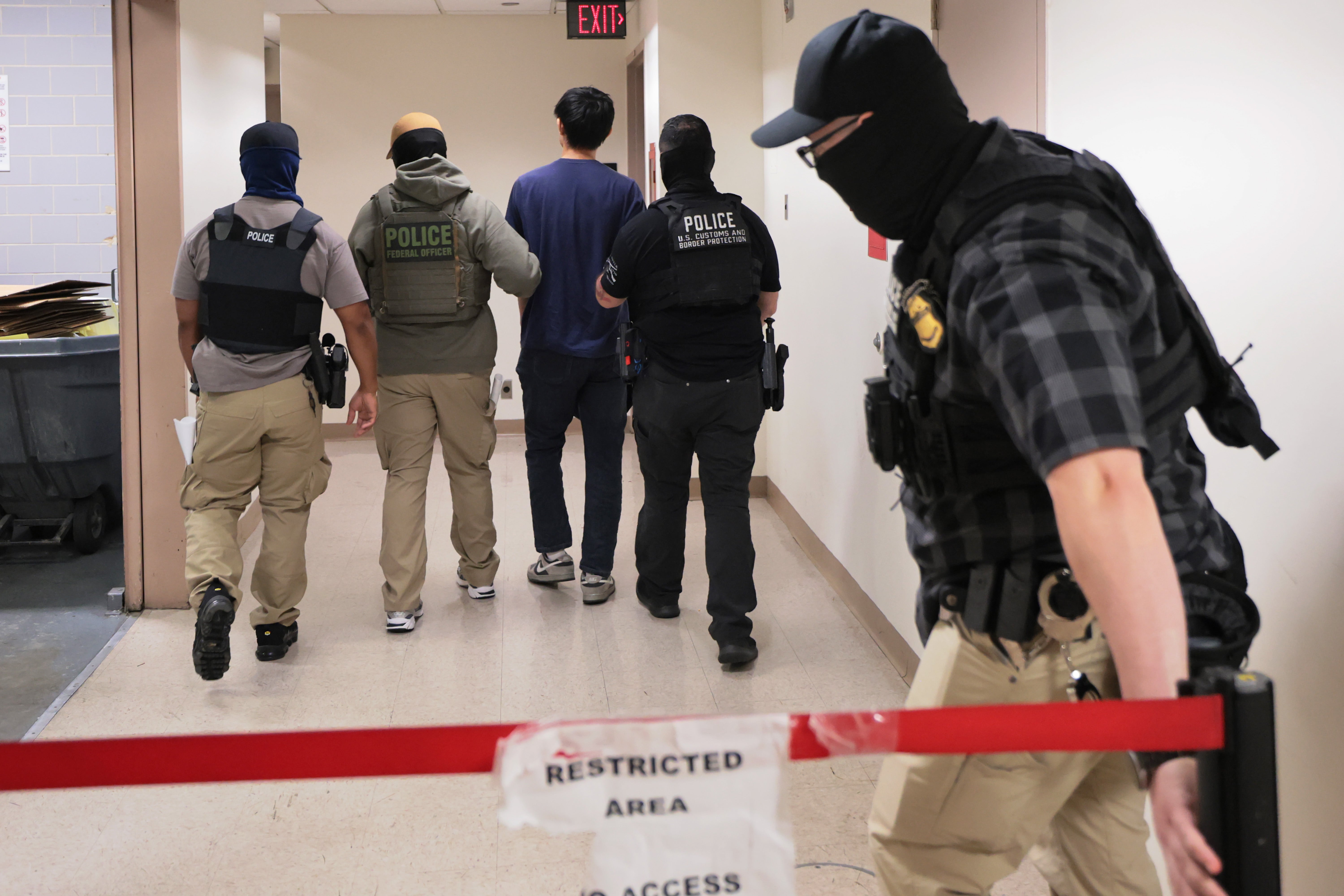A federal judge in New York has ordered Donald Trump’s administration to improve conditions inside a makeshift detention center in downtown Manhattan, where detainees reported little access to food and water, sleeping on cement floors and not having anywhere to bathe for days or weeks at a time.
The order from District Judge Lewis Kaplan on Tuesday arrived just hours after Department of Justice lawyers admitted that immigrants inside the holding facility don’t have access to medication and aren’t allowed to meet with lawyers in person.
A lawsuit from civil rights groups includes several grim accounts from inside the facility on the 10th floor of 26 Federal Plaza, including allegations that a 20-year-old detainee was forced to wear blood-soaked clothing after Immigration and Customs Enforcement agents didn’t provide her with a pad.
In court filings, detainees said they were fed inedible “slop” and were forced to sleep in cells surrounded by the “horrific stench” of sweat, urine and feces in rooms with open toilets.
Other detainees reported spending as much as three weeks inside the facility without a chance to bathe or brush their teeth. Another man said he watched a detainee have a seizure for 30 minutes before medical help arrived.

Kaplan ordered ICE to improve detainees’ access to personal hygiene products and medical care, as well as free, unmonitored and confidential calls with lawyers within 24 hours after they are detained.
Cells must also be cleaned three times a day, according to the order.
The order also prohibits people from detaining people in spaces with less than 50 square feet per person, which shrinks the capacity of the largest hold room to roughly a dozen or so people.
Tuesday’s order “sends a clear message: ICE cannot hold people in abusive conditions and deny them their constitutional rights to due process and legal representation,” according to Eunice Cho, senior staff attorney at the ACLU’s National Prison Project, among groups that sued the administration over conditions at the facility.
The Independent has requested comment from the Department of Homeland Security.
In court filings, Hugo Elias Sanchez Trillos described spending nearly three weeks inside that facility, with a three-day break in between when he was transferred to Nassau County jail.
“I was in the same clothes for 19 days, without ever having an opportunity to bathe,” he wrote.
The room “smelled terrible because no one had bathed,” according to Joselyn Chipantiza Sisalema. “There was no bathroom paper, and the guards would throw only a few paper napkins into our room,” she wrote.
Detainees were served food only twice a day, around 8 a.m. and 8 p.m., and “we got water only when the guards felt like it,” Sanchez Trillos wrote.
“The food was processed and awful; it was difficult to eat. It came inside plastic bags that were usually cold,” he said. “The guards would eat their own food in front of us, things like pizza and hamburgers. … We were so hungry and it felt [like] they were jeering at us.”

Videos from inside the facility show roughly two dozen people crammed in, lying on a cement floor with nothing but emergency blankets and thin sheets, steps away from a toilet separated only by a waist-high partition.
“Look how they have us like dogs in here,” the person filming the videos can be heard saying in Spanish.
Footage obtained by the New York Immigration Coalition provides outsiders with a first glimpse of the room, which federal officials have prevented members of Congress from observing.
In the clips, the men inside are seated on benches that line the walls or are lying on aluminum emergency blankets on the bare floor. Two toilets in the room, one of which appears to be covered by tinfoil, are blocked off by a small partition. No doors separate the toilets from the rest of the room.
Following Tuesday’s order, the “shadow 10th floor detention center must be shut down permanently,” coalition president Murad Awawdeh said in a statement.

Immigrants’ rights groups, lawyers and lawmakers have warned for weeks about deteriorating conditions inside the building, which also houses immigration courts. Federal law enforcement officers have been stationed in the building’s hallways since at least May 20 to make arrests moments after immigrants appear in court.
The “hold room” is not intended to hold people for longer than 12 hours, according to ICE’s internal guidance. In May and June, when arrests at immigration check-ins and courthouses began to skyrocket, immigrants were being held inside the room for 29 hours on average, according to a review from New York City news outlet The City. Within those two months, 81 people were detained there for four days or more at a time.
Detentions peaked on June 5, when 186 people were held there overnight, The City found.
Thousands of people across the country have faced arrest after showing up for court-ordered ICE check-ins and immigration court hearings as part of the Trump administration’s mass deportation agenda.
Unlike federal district court judges, immigration court judges operate under the direction of the attorney general’s office.
The Department of Justice’s Executive Office for Immigration Review has issued guidance to judges to grant motions from government lawyers to immediately dismiss immigrants’ cases, making them easy targets for arrest and removal.




